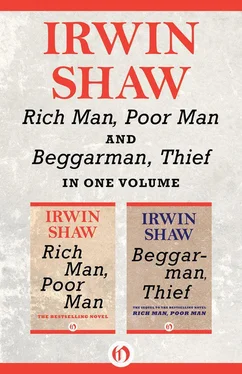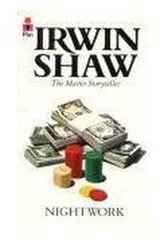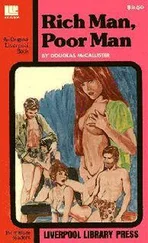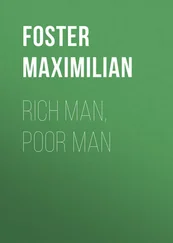But when he got into the double bed, Rudolph awoke. “Where you been?” Rudolph asked sleepily.
“Just to the show.”
“How was it?”
“Lousy.”
The two brothers lay still in the darkness. Rudolph moved a bit toward the other side of the bed. He thought it was degrading to have to sleep in the same bed with his brother. It was cold in the room, with the window open and the wind coming off the river. Rudolph always opened the window wide at night. If there was a rule, you could bet Rudolph would obey it. He slept in pajamas. Tom just stripped to his shorts for sleeping. They had arguments about that twice a week.
Rudolph sniffed. “For Christ’s sake,” he said, “you smell like a wild animal. What’ve you been doing?”
“Nothing,” Tom said. “I can’t help the way I smell.” If he wasn’t my brother, he thought, I’d beat the shit out of him.
He wished he’d had the money to go to Alice’s behind the railroad station. He’d lost his virginity there for five dollars and he’d gone back several times after that. That was in the summer. He had had a job on a dredge in the river and he told his father he made ten dollars a week less than he actually did. That big dark woman, that Florence girl, up from Virginia, who had let him come twice for the same five dollars because he was only fourteen and he was cherry, that would have really finished the night off. He hadn’t told Rudolph about Alice’s either. Rudolph was still a virgin, that was for sure. He was above sex or he was waiting for a movie star or he was a fairy or something. One day, he, Tom, was going to tell Rudolph everything and then watch the expression on his face. Wild animal. Well, if that’s what they thought of him, that’s what he was going to be—a wild animal.
He closed his eyes and tried to remember what the soldier looked like, down on one knee on the pavement with the blood leaking all over his face. The image was clear, but there was no pleasure in it any more.
He started to tremble. The room was cold, but that wasn’t why he was trembling.
V
Gretchen sat in front of the little mirror which was propped up on the dressing table against the wall of her room. It was an old kitchen table she had bought at a junk sale for two dollars and painted pink. There were some cosmetic jars on it and a silver-backed brush she had gotten as a present on her eighteenth birthday and three small bottles of perfume and a manicure set all neatly laid out on a clean towel. She had on an old bathrobe. The worn flannel was warm against her skin and gave her some of the same feeling of coziness she used to have when she came in out of the cold and put it on before bedtime as a young girl. She needed what comfort she could find tonight.
She scrubbed the cold cream off her face with a piece of Kleenex. Her skin was very white, a heritage from her mother, like her blue, shading-to-violet eyes. Her straight, black hair was like her father’s. Gretchen was beautiful, her mother said, just as she had been when she was Gretchen’s age. Her mother was constantly imploring her not to allow herself to decay, as she had done. Decay was the word her mother used. With marriage, her mother intimated, decay set in immediately. Corruption lay in the touch of a man. Her mother did not lecture her about men; she was sure of what she called Gretchen’s virtue (that was another word she used freely), but she used her influence to get Gretchen to wear loose clothes that did not show off her figure. “There’s no sense in seeking out trouble,” her mother said. “It comes finding you out soon enough. You have an old-fashioned figure, but your troubles will be strictly up-to-date.”
Her mother had once confided to Gretchen that she had wanted to be a nun. There was a bluntness of sensibility there that disturbed Gretchen when she thought about it. Nuns had no daughters. She existed, aged nineteen, seated in front of a mirror on a March night in the middle of the century because her mother had failed to live up to her destiny.
After what had happened to her tonight, Gretchen thought bitterly, she herself would be tempted to enter a nunnery. If only she believed in God.
She had gone to the hospital as usual after work. The hospital was a military one on the outskirts of town, full of soldiers convalescing from wounds received in Europe. Gretchen was a volunteer worker five nights a week, distributing books and magazines and doughnuts, reading letters to soldiers with eye wounds and writing letters for soldiers with hand and arm injuries. She wasn’t paid anything, but she felt it was the least she could do. Actually, she enjoyed the work. The soldiers were grateful and docile, made almost childlike by their wounds, and there was none of the tense sexual parading and reconnoitering that she had to endure in the office all day. Of course, many of the nurses and some of the other volunteers slipped off with the doctors and the more active officer-wounded, but Gretchen had quickly shown that she wasn’t having any of that. So many girls were available and willing, that very few of the men persisted. To make it all easier, she had arranged to be assigned to the crowded enlisted men’s wards, where it was almost impossible for a soldier to be alone with her for more than a few seconds at a time. She was friendly and easy with men conversationally, but she couldn’t bear the thought of any man touching her. She had been kissed by boys from time to time, of course, at parties and in cars after dances, but their clumsy gropings had seemed meaningless to her, unsanitary and vaguely comic.
She never was interested in any of the boys who surrounded her in school and she scorned the girls who had crushes on football heroes or boys with cars. It all seemed so pointless . The only man she had ever speculated about in that way was Mr. Pollack, the English teacher, who was an old man, maybe fifty, with tousled gray hair, and who spoke in a low, gentlemanly voice and read Shakespeare aloud in class. “‘To-morrow, and to-morrow, and to-morrow, creeps in this petty pace from day to day …’” She could imagine herself in his arms, and his poetic and mournful caresses, but he was married and had daughters her age and never remembered anyone’s name. As for her dreams … She forgot her dreams.
Something enormous was going to happen to her, she was sure, but it wasn’t going to be this year or in this town.
As she went on her rounds in the loose, gray smock provided by the hospital, Gretchen felt motherly and useful, making up in a small way for what these courteous, uncomplaining young men had suffered for their country.
The lights were low in the wards and all the men were supposed to be in bed. Gretchen had made her usual special visit to the bedside of a soldier named Talbot Hughes, who had been wounded in the throat and couldn’t speak. He was the youngest soldier in the ward and the most pitiful and Gretchen liked to believe that the touch of her hand and her good-night smile made the long hours before dawn more bearable for the boy. She was tidying the common room, where the men read and wrote letters, played cards and checkers and listened to the phonograph. She stacked the magazines neatly on the center table, cleared off a chessboard and put the pieces in their box, dropped two empty Coca-Cola bottles into a waste-basket.
She liked the little housewifely end of the night, conscious of the hundreds of young men sleeping around this central, warm core of the hospital block, young men saved from death, acquitted of war, young men healing and forgetting fear and agony, young men one day nearer to peace and home.
She had lived in small, cramped quarters all her life and the spaciousness of the common room, with its pleasant light-green walls and deep upholstered chairs, made her feel almost like a hostess in her own elegant home, after a successful party. She was humming as she finished her work and was just about to turn out the light and start for the locker room to change her clothes when a tall young Negro in pajamas and the Medical Corps maroon bathrobe limped in.
Читать дальше











